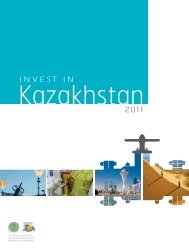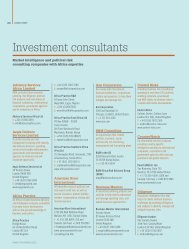NIGERIA Invest in 2012-13 - Newsdesk Media
NIGERIA Invest in 2012-13 - Newsdesk Media
NIGERIA Invest in 2012-13 - Newsdesk Media
You also want an ePaper? Increase the reach of your titles
YUMPU automatically turns print PDFs into web optimized ePapers that Google loves.
Although efforts to br<strong>in</strong>g electricity to the<br />
whole of Nigeria have been slow to materialise<br />
so far, the sheer force of development looks set<br />
to change th<strong>in</strong>gs. As Rob<strong>in</strong> Pagnamenta f<strong>in</strong>ds<br />
out, the benefits of successfully creat<strong>in</strong>g a<br />
national grid could be enormous<br />
Nigeria’s plentiful supplies of oil and gas<br />
have made it Africa’s energy superpower, with<br />
an economy set to outpace India and Brazil<br />
this year with growth of more than<br />
eight per cent. But dreams of a brighter<br />
future for the country, which has the world’s seventh largest<br />
gas reserves and is one of the biggest emerg<strong>in</strong>g markets<br />
globally, rema<strong>in</strong> hobbled by a strik<strong>in</strong>g irony.<br />
Nigeria’s chronic lack of electricity is an obstacle to more<br />
balanced growth and an understandable source of concern<br />
among <strong>in</strong>vestors. “Almost nobody gets cont<strong>in</strong>uous supply from<br />
the grid,” says Chris Pooley, an energy consultant at<br />
eng<strong>in</strong>eer<strong>in</strong>g group Ramboll, who is advis<strong>in</strong>g Nigeria’s<br />
government on how to improve the situation. Decades of<br />
under<strong>in</strong>vestment have left more than 60 per cent of the<br />
nation’s 167 million people without a grid connection.<br />
Dur<strong>in</strong>g the last 20 years of the 20th century, the<br />
country’s nationalised power company built no new power<br />
stations at all, while ma<strong>in</strong>ta<strong>in</strong><strong>in</strong>g what is left – a mixture of<br />
rust<strong>in</strong>g gas and hydroelectric power stations, many of which<br />
were built 40 or more years ago – has become a daily struggle.<br />
In 2010, the Nigerian system collapsed almost weekly, each<br />
time tak<strong>in</strong>g one to two days to restore full supply.<br />
Issues and opportunities<br />
But even for those households and bus<strong>in</strong>esses lucky enough to<br />
have a connection, power supplies are at best erratic, with<br />
shortages 60 per cent of the time. In total, Africa’s most<br />
populous nation currently produces 4,000 megawatts of<br />
electricity – ten times less than South Africa, a country with<br />
one third as many people, and roughly equivalent to the amount<br />
of energy used by the area around Tokyo’s Narita airport.<br />
This lack of reliable power has become the source<br />
of a variety of problems, sharply push<strong>in</strong>g up the cost<br />
of do<strong>in</strong>g bus<strong>in</strong>ess <strong>in</strong> the country and act<strong>in</strong>g as a drag<br />
on <strong>in</strong>ward <strong>in</strong>vestment.<br />
About 60 million Nigerians are forced to rely on<br />
generators and fork out $<strong>13</strong> billion a year refuell<strong>in</strong>g them with<br />
costly diesel. “It’s bad for bus<strong>in</strong>ess and bad for the country.<br />
ENERGY 117<br />
Every hotel, every significant bus<strong>in</strong>ess has a generator – it’s<br />
essential,” says Liz Donnelly, who runs the Nigeria programme<br />
at London-based foreign-affairs th<strong>in</strong>k tank Chatham House.<br />
She po<strong>in</strong>ts to Nigeria’s t<strong>in</strong>y manufactur<strong>in</strong>g sector – just<br />
four per cent of GDP – as one consequence of the situation.<br />
“Bigger companies can afford it, but for small bus<strong>in</strong>ess it<br />
makes life very difficult.”<br />
Donnelly believes that overhaul<strong>in</strong>g the power <strong>in</strong>dustry is<br />
one of the biggest national priorities, but also th<strong>in</strong>ks it<br />
represents an opportunity to catapult Nigeria’s economy <strong>in</strong>to a<br />
different league. “Power-sector reform is absolutely crucial,”<br />
she says. “Reliable power would enable small bus<strong>in</strong>esses to<br />
develop and <strong>in</strong>crease economic activity... It really could be<br />
transformational for Nigeria’s economy.”<br />
But it’s not just bus<strong>in</strong>esses that are suffer<strong>in</strong>g. In a<br />
country where the majority of citizens live on less than $2 a<br />
day, the shortages also prevent many of Nigeria’s poorest<br />
people from improv<strong>in</strong>g their own lives – by us<strong>in</strong>g electric light<br />
to read or study at night. Access to water pumps, mobile<br />
phones and the <strong>in</strong>ternet is also restricted.<br />
“In terms of security, energy is very important, too.<br />
There is a huge youth bulge <strong>in</strong> Nigeria and a need to<br />
create jobs,” adds Donnelly.<br />
So it comes as no surprise that President Goodluck<br />
Jonathan’s government has made tackl<strong>in</strong>g Nigeria’s energy<br />
problems a major national priority.<br />
Ambitious plans<br />
This year, the adm<strong>in</strong>istration will try to breathe new life <strong>in</strong>to<br />
the <strong>in</strong>dustry by complet<strong>in</strong>g the break-up of Nigeria’s state<br />
electricity company – Power Hold<strong>in</strong>g Company of Nigeria<br />
(PHCN). In an ambitious programme that is hoped to pump<br />
cash <strong>in</strong>to the <strong>in</strong>dustry on an unprecedented scale, six power<br />
stations and 11 electricity distribution firms will be spun off to<br />
private companies <strong>in</strong> the next few months.<br />
They will operate them <strong>in</strong>dependently under the<br />
oversight of a transmission company and a bulk trader, which<br />
will rema<strong>in</strong> <strong>in</strong> state control.<br />
Under the plans, first unveiled <strong>in</strong> 2010 and which are<br />
be<strong>in</strong>g supported by the World Bank, the government hopes to<br />
boost Nigeria’s generat<strong>in</strong>g capacity to 5,000 megawatts by the<br />
end of this year and 6,000 megawatts by 20<strong>13</strong>.<br />
To truly meet the needs of its 150 million people,<br />
the nation’s generat<strong>in</strong>g capacity will ultimately have to<br />
<strong>in</strong>crease tenfold – to 40,000 megawatts – a level that<br />
will require massive <strong>in</strong>vestment of an estimated<br />
$100 billion over the next decade.<br />
INvEst IN <strong>NIGERIA</strong> <strong>2012</strong>-<strong>13</strong>







